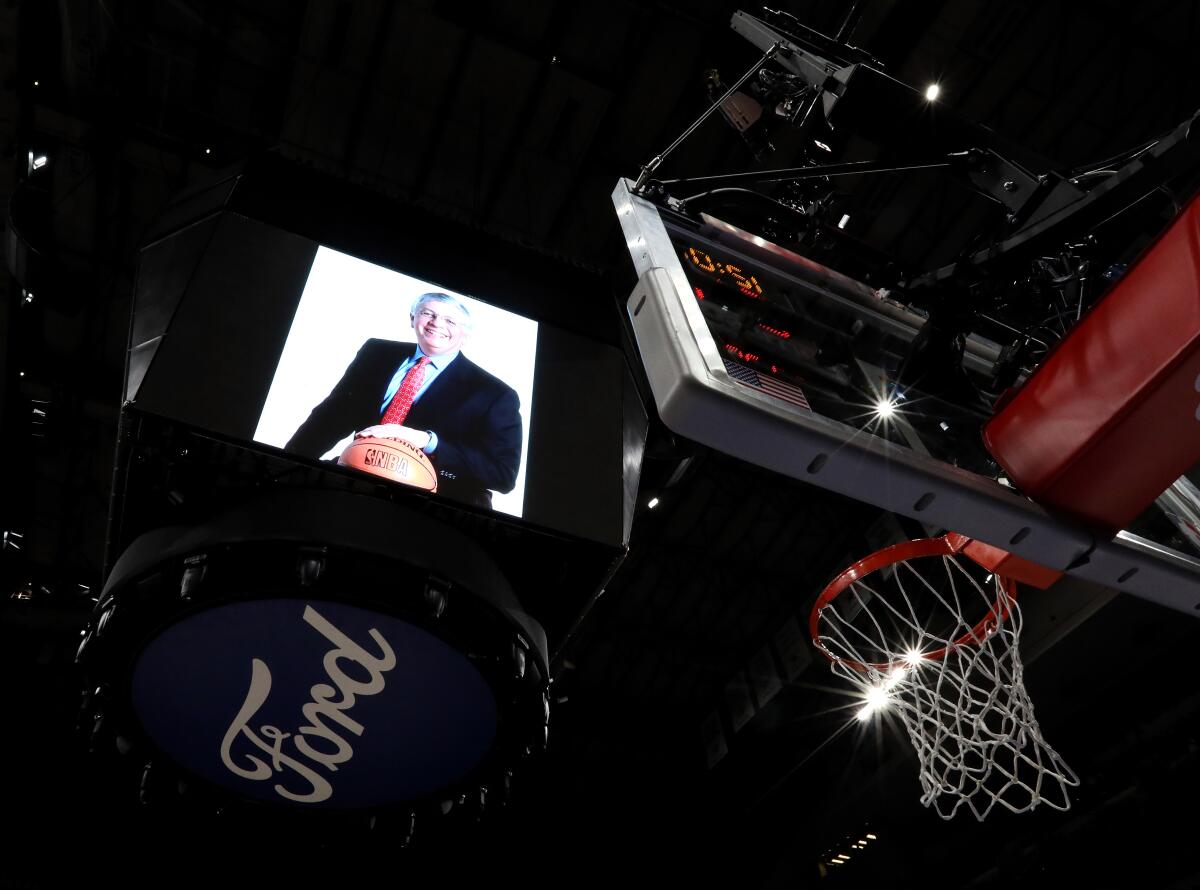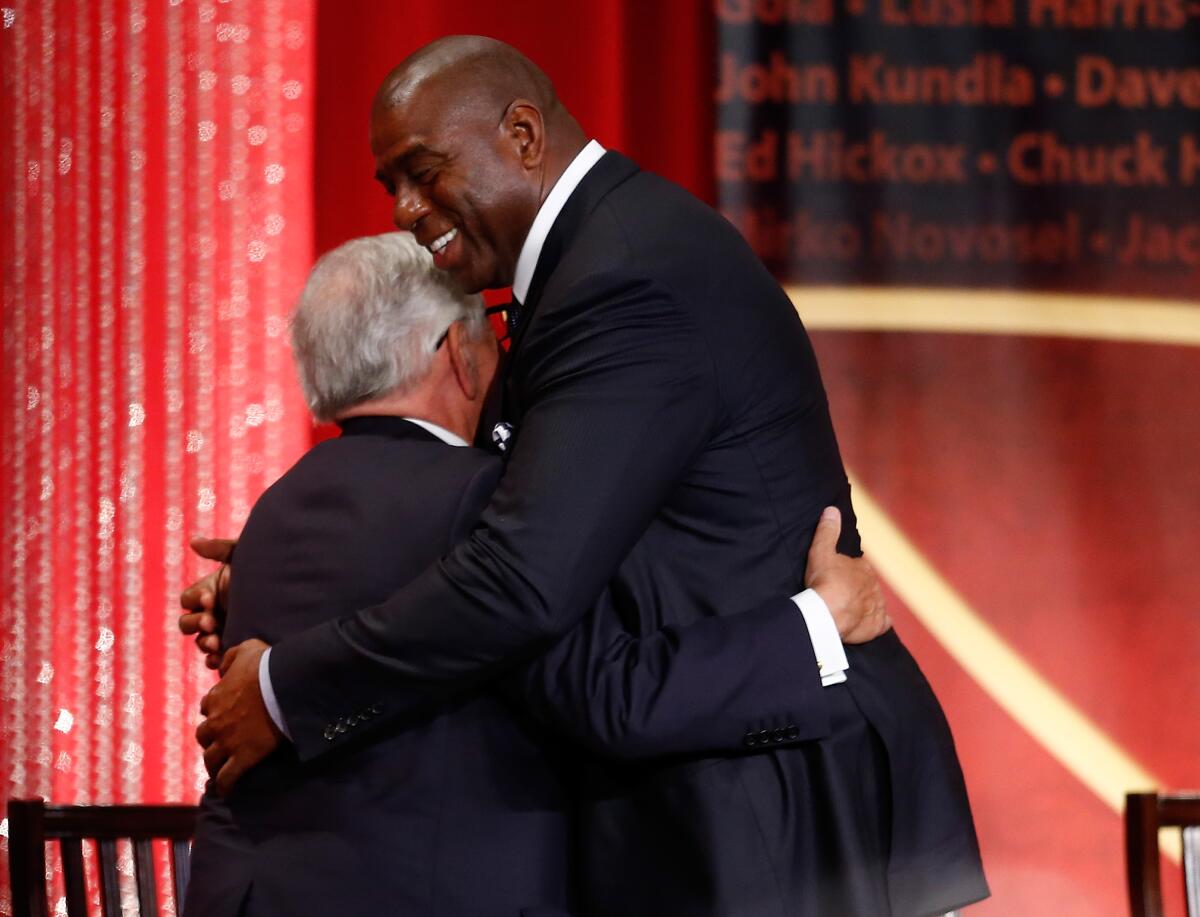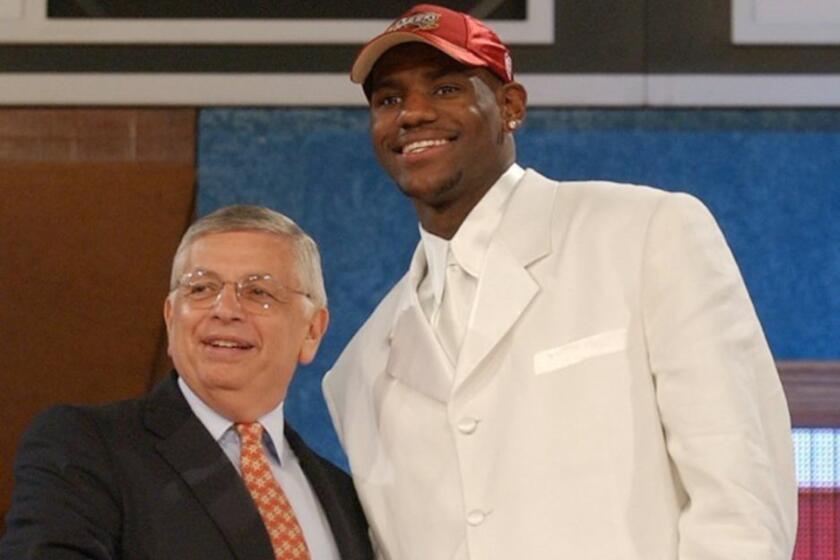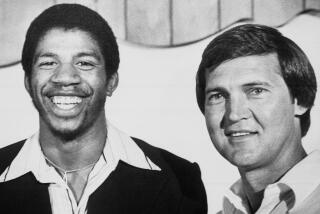Column: David Stern’s greatest legacy is how he changed the dialogue on HIV/AIDS

When you enter Brasserie 8½ in midtown Manhattan, a gorgeous, spiral staircase that leads down to the restaurant’s iconic bar is there to greet you. It’s such a flattering piece of architectural design that even someone wearing Ed Hardy looks chic strolling down the steps.
The popular French establishment has appeared in numerous films and television shows over the years, including “Sex and the City” in an episode serendipitously entitled “The Real Me.”
It’s where Golden State Warriors President Rick Welts told his former boss, David Stern, that he loved him for the first and only time in their near-40-year friendship.
Stern hired Welts to be the NBA’s director of national promotions at a time in which the league was as popular as unsalted rice cakes. Stern sent a $10,000 check to help establish a scholarship in honor of Welts’ partner shortly after the partner died of complications from AIDS in 1994. This was done despite Welts being closeted and never sharing information about his relationship with anyone at work. And when Welts finally came out in 2011, Stern was one of his biggest supporters.
So as Welts and his new partner Todd recently made their way down that grandiose spiral staircase — in the process spotting Stern, whom they hadn’t seen in a year — Welts felt the need to tell the 77-year-old former NBA commissioner, who was fighting for LGBTQ inclusion in sports before it was even a thing, that he loved him.
That was on Nov. 12. On Dec. 12, Stern returned to the restaurant for lunch. It was there that he suffered the brain hemorrhage that eventually cost him his life.
“I asked myself that question a thousand times,” Welts said when asked why he told Stern he loved him that day, after so much time. ”It wasn’t like I was expecting ‘I love you too’ to come back. I didn’t feel like he was in failing health or anything of that. I’m just so glad that it came over me at that moment.”
As the stories and tributes pour in honoring a commissioner who took over a league that, at one point, was so downtrodden that Finals games aired at 11:30 p.m. ET, we should not allow this extraordinary chapter of his life to be relegated to a footnote simply because society has changed. Especially considering Stern was a leader rather than just a contributor to that change.
David Stern, the longtime NBA commissioner who shepherded the NBA from the edges of disaster to unimaginable success, has died at 77.
“When I first got into the league you could say a lot of things and not be fined,” said Jason Collins, who was drafted in 2001 and came out in 2013. The following year, he became the first openly gay athlete to play in the big four U.S. sports leagues. “When they started fining people, I knew if I were to ever step forward, I would have the support of the league office and Stern. For people to live their authentic lives in a workplace environment you need the support of the leaders.
“Before the announcement went public, my agent and I made a call into the league office and we got on the phone with David and Adam [Silver, the current commissioner] and told them what was happening and they were extremely supportive,” Collins said. “They asked if I would attend an event in New York for GLSEN” — the Gay, Lesbian, Straight Education Network, an organization in which I am a board member — “and [I] didn’t even know the NBA had a relationship [with] and were supportive of LGBTQ organizations.
“That was the first time I saw Commissioner Stern face to face after making the announcement and he was so just receptive. I wouldn’t have felt comfortable coming out if not for him and the way he changed the culture with regards to not allowing homophobia in our sport anymore.”
At least not open expressions of homophobia.
Like other “isms” and “skisms”, an overseeing body or government cannot legislate away prejudice and fear. However, it can try to minimize its impact on others. When it comes to the world of sports, there is no greater example of this than Stern allowing Magic Johnson to play in the 1992 All-Star game after he was voted in as a starter despite HIV forcing him into retirement. And while being gay and having HIV is not and was never synonymous, that distinction didn’t matter with regards to how it was reported in the news or spoken about, especially back then.

“In 1991, the world was a much different place,” said Lon Rosen, executive vice president and chief marketing officer for the Dodgers. Rosen, who knew Stern before he became commissioner, was Johnson’s agent at the time. “In those days, HIV meant death. There were players who didn’t want him to play. Owners were also very upset.”
Today, HIV is a treatable, chronic disease. However, by the end of 1991, the year Johnson announced he was HIV-positive, the Centers for Disease Control and Prevention listed AIDS as the second leading cause of death among men 25 to 44 years of age. It was one of the five leading causes of death among women 15 to 44.
“But David didn’t let fear guide him,” Rosen said. “He got as much information as he possibly could. Spoke to all of the top scientists. Elizabeth Glaser (who became a renowned AIDS activist after contracting HIV in 1981) was very instrumental in helping David. It was literally all hands on deck. His first priority was saving Earvin. His second was figuring out a way to use this to help save others.”
Which led to, among other things, Johnson doing a Nickelodeon special with HIV-positive children, talking about living with the disease and the stigmas attached to it.
“I just want people to know that we are just normal people,” said Hydeia Broadbent, who was then 7 and fighting back tears.
“Aw, you don’t have to cry,” Johnson said to her, “because we are normal people. OK? We are.”
LeBron James, Dwight Howard and others will never forget the impact former NBA commissioner David Stern made in their lives.
That moment, and all the good that came from it — such as Broadbent growing up to become an HIV/AIDS activist herself — does not happen without Stern’s compassion, courage and leadership.
“He looked back at this as his proudest moment,” Welts said of Stern. “He completely changed the dialogue on HIV/AIDS. It went from no one knowing anyone with the virus to everyone knowing at least one person that they liked and or loved who was HIV-positive. I’m not sure another person could have guided that process.”
It was announced that all NBA players and referees will wear a black band on their uniforms to honor Stern’s life. I understand the gesture, but forgive me for thinking it’s a tad out of place. Black exists in the absence of light. When the sports world was in the dark with regards to LGBTQ inclusion, for decades, Stern was the brightest of lights.
More to Read
Go beyond the scoreboard
Get the latest on L.A.'s teams in the daily Sports Report newsletter.
You may occasionally receive promotional content from the Los Angeles Times.













